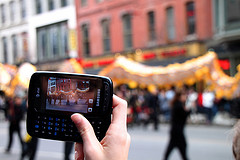3 Ways Travelers can Avoid the Slam of the Smartphone
16 November 2012
As many travelers have unhappily learned the hard way: calling and texting from abroad can result in painfully high smartphone bills with data service rates that can quickly lead you straight into financial insolvency.
This is because the standard international roaming rate is outrageous: as high as $5.00 per minute! A megabyte of data can cost a traveler as much as $20.00. Checking your Facebook friend’s status can cost as much as $4.00 – that’s a lot of money to see your best friend’s latest pet photo.
The good news is that there are many ways to avoid the smartphone slam. Here are 3 ways to avoid getting hit with a big smartphone bill after your trip.
1. Try Getting Away from it All – go Blissfully Disconnected
If you’re the kind of person who frequently loses their cell phone or leaves it in the car or at your desk, then you are probably quite capable of leaving the phone at home and going blissfully disconnected on your trip.
To accomplish this, you’ll need to put your itinerary, hotel info, contact numbers, etc. on paper and hand one copy to a friend or loved one. It’s important to note that the world doesn’t really cater to this type of travel anymore, so you’ll have to wing it with dinner reservations and check your guide book for the time that museum closes.
The good thing with this type of travel is that you’re probably going to get to know your hotel concierge on a very personal basis.
2. Try Leaving it for Most of the Day – go Semi-Connected
If you don’t feel the need to be constantly connected and you can wait until you get back to the hotel or coffee shop to check messages and plan the next day’s itinerary, then you can probably go semi-connected.
To accomplish this, you’ll want to do a little research ahead of time because many hotels offer free wi-fi only in the lobby. This is true of hostels and campgrounds too – the wi-fi is acceptably fast and always available, but in a public location. You’ll also want to turn the international data roaming on your phone to off.
Install an app like Google Voice or Skype, which can dial out to a real world phone number in a pinch for a low price. Calling back to the U.S. is as low as one cent per minute and calling other countries – like the one you happen to be in right now – is usually something like a tenth of the price of a standard smartphone plan.
When you go out each day, bring your smartphone along for emergencies and even the occasional 50-cent text message if you make local friends or lose your travel companions.
3. Try a Lesson in Moderation – go Moderately Connected
If you’re the kind of person who easily makes friends in a new place and want to be able to contact them later, or want the option to check with online review sites to choose the best Italian restaurant, or need to check your email occasionally, you can likely go moderately connected.
To accomplish this, you’ll want to get an international SIM card or consider a competitive international data plan. SIM cards can take a little getting used to – you make a call, enter the number and press send and the call appears to be disconnected. After a few seconds, it rings and you’re connected. It’s weird at first, but doesn’t take too long to get used to.
Most of the time, you can roam from country to country and the phone switches to local providers along the way, but you’ll need to research and compare domestic company rates and coverage for each country.
An international data plan can still ring up very high bills as the cost of voice minutes is still relatively high and doesn’t compete with the SIM international rates. Plus, many overconnected travelers find themselves falling into old habits and start racking up $15 and $20 per day in data charges.
Power users and smartphone addicts have little choice but to forego foreign travel for now. It’s just too pricey for you to leave the U.S., so stay in your home country and take advantage of all that’s available here.
Before you go – do these things right before leaving
It’s very easy to forget changing your phone settings until you’re already abroad – at which point everything that is automatically pushed to your phone will start downloading as soon as it finds a signal. That can cost you a lot of money pretty darn quick.
To avoid these instant charges, do these things before you leave stateside:
- Turn off 3G or 4G
- Turn off cellular data
- Turn off data roaming
- Reset your usage statistics
The first three will prevent you from running up data charges without knowing it, the last lets you track your minutes, data, and texts used on your trip.
Damian Tysdal is the founder of CoverTrip, and is a licensed agent for travel insurance (MA 1883287). He believes travel insurance should be easier to understand, and started the first travel insurance blog in 2006.
